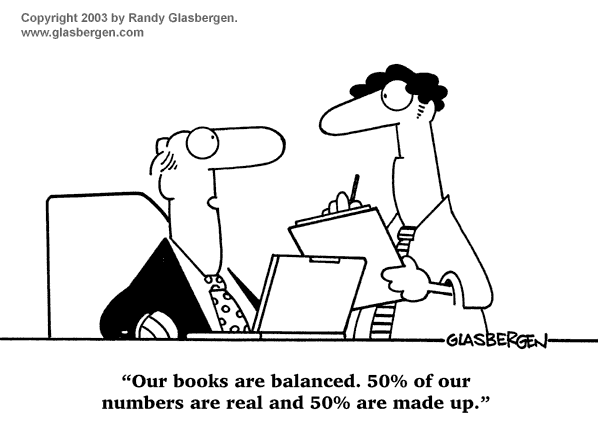"Surprise, Surprise....." Big Banks Mask Risk Levels - Quarter-End Loan Figures Sit 42% Below Peak
At least one has to conclude / "admire" that they have "CHUZPAH"....... Just one more reason for Cramer´s Bull Case For Banks ... You really need a good dose of "humor" & GOLD to stay calm these days....;-)
Vor soviel "CHUZPAH" muß man ehrlich den Hut ziehen....... Ein Grund mehr für Cramer´s Bull Case For Banks .... Heutzutage muß man schon ein sehr "humorvoller" Zeitgenosse & "GOLD-BUG" sein um den tagtäglichen "Wahnsinn" nicht nur kopfschüttelnd zu erleben..... ;-)
Big Banks Mask Risk Levels WSJ
Evidence That Primary Dealers Have Collectively Engaged In Repo 105 And Qtr-End Book Cooking Type Schemes For Years ZH

Vor soviel "CHUZPAH" muß man ehrlich den Hut ziehen....... Ein Grund mehr für Cramer´s Bull Case For Banks .... Heutzutage muß man schon ein sehr "humorvoller" Zeitgenosse & "GOLD-BUG" sein um den tagtäglichen "Wahnsinn" nicht nur kopfschüttelnd zu erleben..... ;-)

Big Banks Mask Risk Levels WSJ
Quarter-End Loan Figures Sit 42% Below Peak, Then Rise as New Period Progresses; SEC ReviewUPDATE:
Major banks have masked their risk levels in the past five quarters by temporarily lowering their debt just before reporting it to the public, according to data from the Federal Reserve Bank of New York.
A group of 18 banks—which includes Goldman Sachs Group Inc., Morgan Stanley, J.P. Morgan Chase & Co., Bank of America Corp. and Citigroup Inc.—understated the debt levels used to fund securities trades by lowering them an average of 42% at the end of each of the past five quarterly periods, the data show. The banks,which publicly release debt data each quarter, then boosted the debt levels in the middle of successive quarters.
The data highlight the banks' levels of short-term financing in the repurchase, or "repo," market. Financial firms use cash from the loans to buy securities, then use the purchased securities as collateral for other loans, and buy more securities. The loans boost the firms' trading power, or "leverage," allowing them to make big trades without putting up big money. This amplifies gains—and losses, which were disastrous in 2008.
According to the data, the banks' outstanding net repo borrowings at the end of each of the past five quarters were on average 42% below their peak in net borrowings in the same quarters. Though the repo market represents just a slice of banks' overall activities, it provides a window into the risks that financial institutions take to trade.
The SEC now is seeking detailed information from nearly two dozen large financial firms about repos, signaling that the agency is looking for accounting techniques that could hide a firm's risk-taking. The SEC's inquiry follows recent disclosures that Lehman used repos to mask some $50 billion in debt before it collapsed in 2008.
The practice of reducing quarter-end repo borrowings has occurred periodically for years, according to the data, which go back to 2001, but never as consistently as in 2009.
The repo market played a role in recent accusations leveled by an examiner in Lehman's bankruptcy case. But rather than reducing quarter-end debt, Lehman took steps to hide it.
Interactive Graph : Masking Risk
Evidence That Primary Dealers Have Collectively Engaged In Repo 105 And Qtr-End Book Cooking Type Schemes For Years ZH
The graphic representation of the Primary Dealer holdings of net assets shown as a Lo-High range during any given quarter, together with the closing net assets (presented by the red dot), is shown on the chart below.

We are confident that armed with this data, the SEC will be able to provide a prompt and logical response ( JMF : SARCASM AT ITS BEST!) why the PDs have such a peculiar pattern in downshifting their assets toward quarter end, and much more relevantly, who the counterparties are that would consistently take the other side of these quarter end window-dressing trades.
Labels: "Enron-esque characteristics", balance sheet quality, creative accounting, leverage, regulatory failure, TBTF
![[Most Recent Quotes from www.kitco.com]](http://www.kitconet.com/charts/metals/gold/t24_au_en_usoz_2.gif)
![[Most Recent Quotes from www.kitco.com]](http://www.kitconet.com/charts/metals/gold/t24_au_en_euoz_2.gif)

3 Comments:
lacoste polo
new balance shoes
ralph lauren polo
ray ban sunglasses
dsquared2
fitflops clearance
jordan shoes
ugg outlet
christian louboutin
calvin klein underwear
moncler jackets
kobe shoes
ralph lauren uk
yeezy boost 350 v2
off white jordan 1
nmd
moncler outlet
kobe shoes
michael kors outlet online
yeezy boost 350 v2
converse outlet
hermes bags
balenciaga
balenciaga trainers
longchamp
retro jordans
ferragamo belts
lebron 15 shoes
curry 4 shoes
Post a Comment
<< Home